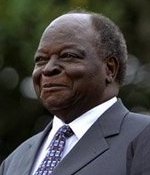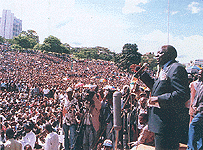



























|

|

|

|

|

|

|

|

|

|

|

|

|

|

|

|

|

|

|

|

|

|

|

|

|

|

|
|
|
|

|
|
|
MWAI KIBAKI |
|


|
|
|
Mwai Kibaki is yet another household name in Kenyan politics. If you ever had questions as to who exactly qualifies as an elite, this is the guy you are looking for. Mwai Kibaki joins a very short list of Kenyans(Africans) who have benefited from a high quality education and an affluent family background. In fact, he hails from Nyeri District in Central Province, whose residents have always been associated with high education and wealth, the likes of Prof. Wangari Maathai. Land in Nyeri is also very fertile, and was the main attraction to the British colonialists, when they came to Kenya. The media in Kenya never misses an opportunity to depict the elitism in Kibaki, often taking pictures of him shooting rounds of golf--Kibaki's and other rich peoples' favourite sport. Some have argued that this perception might have cost Kibaki the presidency in 1992 and 1997 because he is considered not to be in touch with the needs of ordinary Kenyans. He is also said to be too much of a "gentleman" and therefore not suited for Kenya's combative style of politics, exhibited best by his fellow Central Province opponent Kenneth Matiba. Kibaki has also been dogged by his long 10-year tenure as Vice President to President Moi, and his subsequent portfolio as Minister for Health in the same administration. It was for this reason that when he left KANU in 1991 to form his Democratic Party(DP), his opponents were quick to label him a KANU mole in the opposition, an allegation Kibaki initially found hard to shrug off. Kibaki was born on November 15th 1931 in Othaya, Nyeri District of Central Province. A highly intelligent kid, he got admission to Mang'u High School, one of Kenya's premier High Schools, and like Alliance High School, almost a rite of passage for Kenya's rich and famous. As expected, Kibaki excelled at Mang'u before proceeding to the prestigious Makerere University in Kampala, Uganda for a BA course in Economics, History and Political Science. He then enrolled at the London School of Economics for a B.Sc. in Public Finance before returning to Makerere as an Economics Lecturer. Whoever paid for Kibaki's education, must be an extremely gratified individual because every time Kibaki opens his mouth to speak about national issues, you get a sense that this is an extremely well informed individual with an amazing grasp of the nuts and bolts surrounding such issues. Kibaki's entry into Kenyan politics can be traced to the early 1960's when he left his job as a lecturer at Makerere University to work for KANU, and participate in the struggle for independence. In the 1963 General Elections, he contested and won the Bahati seat in Nairobi and was in the following year, appointed Assistant Minister for Economic Planning and Development in Kenyatta's government. He was later moved to the Commerce and Industry Ministry before landing his first powerful job as Minister of Finance and Planning in 1969. After bagging this portfolio, Kibaki became a definite political heavyweight in Kenya and in 1978 when President Moi ascended to power, he made Kibaki his Vice President. Kibaki lasted 10 years as Moi's Vice President, something most Kenyans will tell you is a remarkable achievement, given Moi's well known frequent cabinet reshufflings. In 1988, Kibaki was dropped as Vice President and moved to the Health Ministry, in a clear attempt to clip his political wings. Rumours were rife that Kibaki would ditch KANU and resign in protest, but he stayed put and served well in his new-found Health portfolio. Kibaki finally ditched KANU in December 1991 to form his Democratic Party(DP), just days after the repeal of Section 2(A) of the constitution, which effectively made Kenya a Multi-Party state. Kibaki took a lot of heat for this from his opposition colleagues, who called him a coward for not helping them in their fight to repeal section 2(A) and raised suspicions as to his real intentions, having been a KANU insider for so long. His move was painted as an attempt by KANU to dillute the power of FORD, a pressure group which had just been formed in August(4 months earlier), was enjoying tremendous popularity, and was clearly poised to wrest power from KANU. Somehow Kibaki survived this onslaught and indeed transformed his Democratic Party into a powerful party. He did a brilliant job of targetting the independent voters who wanted nothing to do with the more radical KANU on the one hand and FORD on the other. More blessings came the DP way in August 1992, when the mighty FORD split into two parties, FORD-Kenya under Jaramogi Oginga Odinga and FORD-Asili under Kenneth Matiba. The backlash from this split played into DP's favour and solidified its reputation as a stable and principle-driven party. It also finally gave Kibaki some ammo against his FORD critics, who initially were having field days attacking DP. His party, originally popular only in his Central Province, began making tremendous inroads into Eastern and Western Provinces, long time bastions of KANU. In the 1992 Elections, Moi won with a total of 1,927,640 votes. Kenneth Matiba(FORD-Asili Party) came in second with 1,354,856 votes, followed by Mwai Kibaki(Democratic Party) who got 1,035,507. Oginga Odinga came in fourth with 903,866 votes. It must be stated that Kibaki did pretty well given that the real battle had been anticipated to be between KANU and the two FORDS. After this elections, DP's place as a major political party in Kenya was sealed, and this fact was proven in the 1997 elections, when it gave KANU a run for its money. This time Moi won with a total of 2,500,856 votes. Kibaki(DP) came in second with 1,911,742 votes and Raila Odinga(NDP) was third with 667,886 votes. Kijana Wamalwa(FORD-Kenya) came in fourth with 505,704 votes. Kibaki remains a strong contender for the Presidency, going into the 2002 General Elections and it will be quite interesting to see how he fares in a field without the outgoing President Moi. |
|
|
Return to the Home Page |
|
|
Copyright©AfricanTribute.com Inc., 2002 |
|
|
|

|
|
|
|